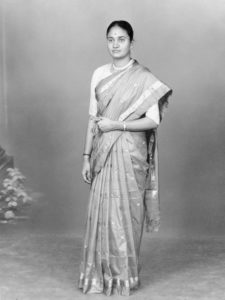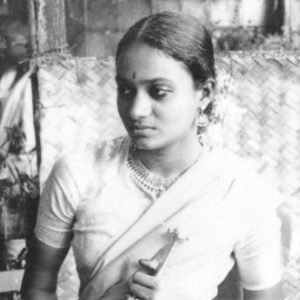 Who is “Bapu”?
Who is “Bapu”?
“Bapu” is the personal name of a Tamil woman named Savithri, who was born of a culturally elite and rich business family, in Tamil Nadu, India. She was born in the time India was under colonial rule, lived through the war, and during the reconstructive post colonial period, saw the worst of the emerging psychiatric system from within the walls of the asylums. She had moved to Chennai in her late twenties, after her marriage. After the birth of two children, she “went mad”, according to her family members. She heard voices, saw visions, wrote religious verses in Tamil and Sanskrit, and experienced herself to be in deep connection with “Krishna”, a deity who elicited the ecstatic devotion of many renunciates, like Lal Ded, Mira, etc. She broke all stereotypes of being a Brahman woman, giving up all signs of a householder and living the life of an ascetic. Bapu was deeply spiritual, beginning with ritualistic and religious prayer, and later, moving to a personal god. She wrote poetry, sang bhajans, wore the dress of a monk and shaved her head. For deviance from her role as the eldest daughter in law of her marital family, she was labeled with “schizophrenia” by the early scientists of the 1960s and treated with incarceration and the new emerging neuroleptics. She was “caught” by the police many times, physically tied up and restrained from running away and forcibly brought back to a very hostile family environment. She was subjected to many invasive treatments and psychiatric abuse, including repeated lock up, solitary confinement, insulin coma, several dozens of shock treatment, repeated and forced institutionalization and many disabling anti-psychotic medications. Her prolific and enlightened poems bespoke of ignorance, non duality and an enduring search for ending human suffering. For this quest, she was punished over and over again with psychiatry and its mind numbing hazards. She left home and escaped those asylums many times, wandering away to religious places and to some favourite god spaces, including Guruvayur and Chottranikara. Eventually, she was deserted by her family, and struggled for daily survival, even though she came from a very wealthy background and had a huge property and a large family in Chennai. She lived many years of her adult life, wandering and possibly hungry, alone and homeless, seeking refuge when possible, singing the praise of Lord Krishna, in and around the temples of Kerala. Various traditional methods were also tried out on her, such as dhara, exorcism, etc. Until deemed “mad” by the communities, her bhakti poetry was published and read as a part of daily prayer by people in Tamil Nadu.
An indelible trauma memory of one of her children, Karthik, is of her “total disappearance” by around mid-1980, until he found her 3-4 years later, beyond recognition, frail and disabled, under the bridge in front of the Ranganathan temple in Tiruchirapalli. Karthik saw his mom sitting along with several homeless people, receiving alms of food given by a generous devotee of Sri Ranganatha swami. In the family reconstruction of this memory, Karthik remembered this as her resistance to being violently and forcibly incarcerated in a private mental asylum, in Chennai. Karthik, a 16 year old boy at this time, carried her small, frail body in his arms and brought her back home, reassuring her that he will never allow this to happen again. She passed on soon after, in the autumn of the year 1996, struck by stroke and coma. She had suffered severe and debilitating side effects of psychiatric treatments, including severe tardive dyskinesia, Parkinson’s and muscular dysfunction. Bapu’s other child, Bhargavi, also a life long victim of trauma brought on by childhood exposure to such asylums, founded the Bapu Trust in her memory and with her legacy.
The Bapu Trust for Research on Mind & Discourse, like “Bapu”, journeys the grey areas between madness and creativity, insanity and spirituality, aspiring to be a “haven” for those excluded and living in the margins of society.
“Give me a place”
I have had enough, can I get a place at your feet?
If not, an inauspicious death is better.
With an unwavering heart, a mind that is not filled with obscenity,
Give me a place near you, or give me poison.
It is better to die than to live as a wandering lunatic,
Please give me a place where I can be near You daily.
If there is no haven for me, my mind will not be cleared,
The hurt that I feel in my heart will not heal,
Please give it to me soon, this ignorant being,
Who has lost herself in You, give me a place”
Poem by “Bapu” a.k.a Savithri Mani.

Bapu Trust does not have any affiliations or connections to political parties of any sort. We are not associated with any religious denomination, cult or tradition.

